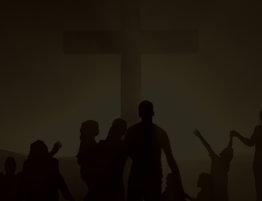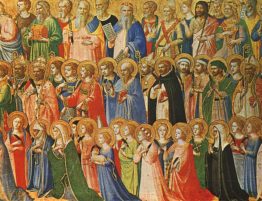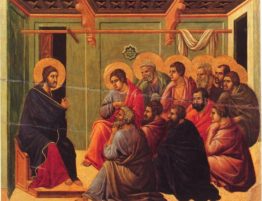
Texts: James 1:16ff, Matthew 6:25ff, Isaiah 12
Harvest festivals are an almost universal aspect of human culture. In the Old Testament, all three of the “Pilgrim Feasts,” the three most important of the Levitical Holy Days are related to the Harvest. Passover includes the offering and celebration of the First Fruits. Pentecost or Weeks is the Spring Harvest, and Tabernacles is the Fall Harvest. Though the early Church did not have a specific Harvest Festival, it is significant that the major Christian feasts of Easter, Pentecost, and Christmas/Epiphany correspond in some way to these Old Testament feasts. And while these are not directly associated with agriculture, various local folk traditions spring up over the centuries, in which the Church does play a part. We have, for example, the Ember Days at the four seasons, the Rogation Days between the end of Eastertide and the Ascension, and Lammas Day in England.
Yet, for those of us in the Anglican tradition, it was we Americans who were the first to put a Harvest Festival, in the form of Thanksgiving Day, into the Book of Common Prayer. From the very first American Prayer Book, we had special readings and prayers for our country’s national Harvest Festival, Thanksgiving Day. Indeed, Thanksgiving Day is one of the two uniquely American celebrations we find in our own Prayer Book, the other being Independence Day. This is something in our American expression of the Anglican tradition that I’ve of which I’ve always been particularly proud.
Now, we are a suburban parish, and most of us here are suburban folk. Though some of us have a vegetable garden or raise chickens or other animals for supplementary food (along with a couple of families who have ranches), I don’t think anyone here is a subsistence farmer. We all get most of our food from H-E-B or some other supermarket. None of us are directly dependent on our own harvest for survival. This is quite different from most folks throughout human history, including most of American history. That can make some of the prayers we use for Thanksgiving seem a bit distant to us. It can make the agricultural themes of biblical passages such as Psalm 147 (an abbreviation of which is used in lieu of the Venite for Thanksgiving morning) a bit harder to relate to our own lives. I’m reminded of a conversation my youngest and I had just a couple of weeks ago at bedtime. In reading the Parable of the Prodigal Son, we got to the end where the fatted calf is killed for the celebration of his homecoming, and Tori asked why the calf had to be killed. I explained that that’s how we get meat. She was absolutely shocked! It never occurred to her that farm animals are raised to provide food for us! And that’s perfectly understandable; she’s never had to be around the slaughter of a chicken, sheep, cow, or even turkey for meat!
Yet we can still exercise thankfulness. We all can take stock of our lives and see the good things God has done for us. St. James’ reminder in our Epistle that “Ever good gift and every perfect gift is from above, and cometh down from the Father of lights, with whom is no variableness, neither shadow of turning” is one that we all need. Our Lord’s reminder of God’s provision in our Gospel is an antidote to anxiety and worry that we all need:
Jesus said, Be not anxious for your life, what ye shall eat, or what ye shall drink; nor yet for your body, what ye shall put on. Is not the life more than food, and the body than raiment? Behold the fowls of the air: for they so not, neither do they reap, nor gather into barns; yet your Heavenly Father feeders them. Are ye not much better than they? . . . But seek ye first the kingdom of God and his righteousness; and all these things shall be added unto you. Be not therefore anxious for the morrow: for the morrow shall take thought for the things of itself. Sufficient unto the day is the evil thereof.
I certainly need this reminder pretty regularly. I like to think of myself as being in control of my family, the church, everything. But I’m not, and neither are you. And we don’t need to be farmers to see how much we must rely on the Lord for everything! In his commentary on our Thanksgiving Day readings, Massey Shepherd says that this Gospel is particularly appropriate for we Americans! He writes:
The suitability of the passage for this day is obvious, and its theme is especially apt for American congregations. We are so prone to be anxious about material things and our physical well-being that we are likely to forget our Lord’s reminder that the primary objective of life is to seek the Kingdom of God and His righteousness. If this is done, material blessings will inevitably ensue; for the evils and injustices that deprive men of their due enjoyment of God’s bounty will be removed.
This ties in, of course, to Saint James’ application of God’s good gifts at the end of our Epistle: “Pure religion and undefined before God the Father is this, To visit the fatherless and widows in their affliction, and to keep himself unspotted by the world.” So let us make sure we’re doing good to those around us. Let us love our neighbor in deed, not just word. Shepherd’s concluding statement about evils and injustices being removed may sound really big, but all such things begin with what each of us can do in our own circles of influence. You can’t solve world hunger, war, or other global catastrophes on your own, but you can do good to those around you! I may be a bit late this year in saying this, but if any of you are without a place to enjoy the Feast tomorrow, let us know; I guarantee you that there are plenty of folks in this church who have an extra seat at the table for a brother or sister in Christ!
So far our readings have given us an exhortation and a call to action, but let’s not forget the most important part of God’s provision. Let’s not forget the Gospel itself. Please turn in your bible to Isaiah 12, one of our Old Testament lessons for Thanksgiving Day:
And in that day thou shalt say, O LORD, I will praise thee: though thou wast angry with me, thine anger is turned away, and thou comfortedest me. Behold, God is my salvation; I will trust, and will not be afraid: for the LORD JEHOVAH is my strength and my song; he also is become my salvation. Therefore with joy shall ye draw water from the wells of salvation. And in that day shall ye say, Praise the LORD, call upon his name, declare his doings among the people, make mention that his name is exalted. Sing unto the LORD for he hath done excellent things: this is known in all the earth. Cry out and shout, thou inhabitant of Zion: for great is the Holy One of Israel in the midst of thee.
Though he’s speaking to Israel and the exiles, Isaiah has often been nicknamed the “Fifth Gospel.” You can’t go more than a couple of chapters in Isaiah without encountering one Messianic prophecies, many of which are very familiar to us through our Christmas and Advent hymns and readings. In fact, just last week we began our reading through Isaiah in the Daily Office Lectionary as the Old Testament capstone for the year, chosen because it falls during Advent and Christmastide. You’ll notice that this chapter begins with the phrase, “in that day.” This ties things back to the previous chapter which begins
And there shall come forth a rod out of the stem of Jesse, and a Branch shall grow out of his roots: and the spirit of the LORD shall rest upon him, the spirit of wisdom and understanding, the spirit of counsel and might, the spirit of knowledge and of the fear of the LORD.
The Messianic significance of these passages is obvious. So, we, as we come before the Lord with thanksgiving, must begin with the realization that God is himself our salvation. That he gives us joyful unending waters from the well of his salvation. This salvation shows that God is not angry with us, but has rescued us in love. And, of course, the very name of the Messiah, Jesus, means “The Lord Saves.” His name is Salvation. As the Angel said to St. Joseph in Matthew 1:21, “and thou shalt call his name JESUS: for he shall save his people from their sins.”
As we read in our Gospel, our Heavenly Father provides for our needs in his goodness. As we read in our Epistle, all good gifts come from him. But as good as bread is, as good as turkey, mashed potatoes, and pie are, these good things are temporary. Bread sustains us in this life, but it only puts off death. We need eternal bread, living bread, if we are to overcome death. As Jesus said in one of tomorrow’s New Testament lessons from John 6, “Labour not for the meat which periphery, but for that meat which endureth unto everlasting life, which the Son of man shall give unto you.” Our Lord Jesus gives us this everlasting life because he is himself the bread of life. So let us begin our Thanksgiving celebration with the Eucharist, the great thanksgiving, as we remember and participate in that salvation. Let us begin our Thanksgiving Feast with the Paschal Feast, giving thanks for all his benefits, temporal and spiritual.
In the Name of the Father, and of the Son, and of the Holy Ghost. Amen.
-
I have been thinking about the verse in James that says every good gift comes from above from the Father of lights. It is a good reminder to seek first God’s Kingdom. Everything else will come. Romans 8:32 says to us that God did not spare His own Son, how shall He not also freely give us all things. It is also a good reminder that Eucharist means ‘thanksgiving.’








